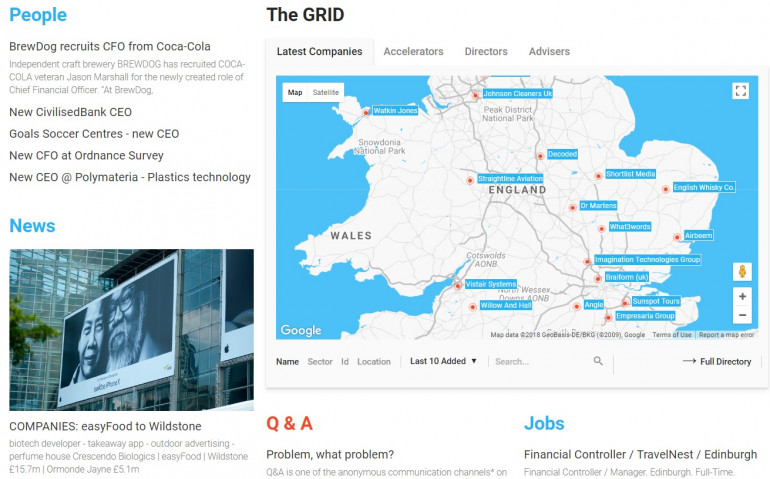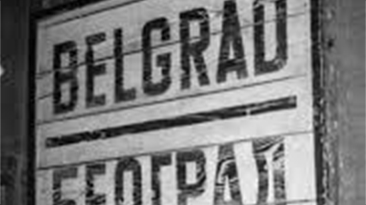Published by Directorzone Markets Ltd on April 18, 2016, 9:00 am in News, Other
Wednesday January 1st 2020

News about 11 UK growth companies and/or accelerators (turnover in brackets) in the GRID marketplace, 10th – 16th April 2016:
Ede & Ravenscroft £39.6m | Heptares Therapeutics | The Medical Research Council (MRC) £94.9m | Bizfitech | Funding Options | Composite Reinforcements £5m | Heck! Food £5.7m | Sisters Grimm £2m | CCL Holdings £83.8m | Spark Energy £119m
EDE & RAVENSCROFT: Royal wedding tailor pays out | Sunday Times. April 10
DZ profile:
Business: tailor and gown maker. Holds three royal warrants and supplied suits for the Duchess of Cambridge’s father, Michael Middleton, and her brother at her wedding in 2011.
Launched: 1689
Location: London
Staff: owned by the family of chairman Michael Middleton — no relation to the Duchess’s family.
Financials: reported a 1.5% increase in sales to £39.6m and 8.3% growth in pre-tax profits to £1.4m.
News: has paid a £151,200 dividend to its family owners after a modest rise in sales and profits.
Alzheimer’s cash for health quango | Peter Evans, Sunday Times
HEPTARES THERAPEUTICS
DZ profile:
Business: spun out of a Cambridge University laboratory in 2007. Was founded to develop and commercialise pioneering research from the MRC Laboratory of Molecular Biology (LMB; Cambridge, UK) and the National Institute of Medical Research (London, UK). “Heptares is a clinical-stage company creating transformative medicines targeting G protein-coupled receptors (GPCRs), a superfamily of receptors linked to a wide range of human diseases.”
Launched: 2007
Location: Welwyn Garden City, Hertfordshire
Founders: Malcolm Weir, Founder, Chairman and Chief Executive Officer; Executive VP and Chief R&D; Officer of Sosei. Fiona Marshall, Founder, Director, and Chief Scientific Officer; Executive VP and CSO of Sosei.
Investment: Heptares was sold last year to Japanese developer Sosei Group Corporation for up to $400m, but it is understood that the MRC retains an interest in any future sales.
News: last week signed a $3.4bn (£2.4bn) licensing deal with American giant Allergan. Under the deal, Heptares receives $125m up front, with more than $3bn contingent on regulatory approval and hitting sales targets.
THE MEDICAL RESEARCH COUNCIL (MRC)
DZ profile:
Business: Website – “...improves human health through world-class medical research. We fund research across the biomedical spectrum, from fundamental lab-based science to clinical trials, and in all major disease areas. Our research has resulted in life-changing discoveries for over a hundred years. Between 2006 and 2014: more than 1,000 products and interventions in development; creation or growth of 88 companies; 1,047 patents granted or published, with around 22 per cent licensed. The MRC’s intellectual property, and the commercialisation of it, is managed by a separate organisation, MRC Technology."
Wikipedia – “is a publicly funded government agency responsible for co-ordinating and funding medical research in the United Kingdom. It is one of seven Research Councils in the UK and is answerable to, although politically independent from, the Department for Business, Innovation and Skills. The MRC focuses on high-impact research and has provided the financial support and scientific expertise behind a number of medical breakthroughs, including the development of penicillin and the discovery of the structure of DNA. Research funded by the MRC has produced 30 Nobel Prize winners to date."
Launched: 1913
Location: head offices in Swindon and London. The MRC has 27 units and three institutes* in the UK and one unit in each of The Gambia and Uganda. It also has 26 centres offering partnerships with UK universities to develop centres of scientific excellence. *Including the Francis Crick Institute - a partnership between the MRC, Cancer Research UK, the Wellcome Trust, University College London, Imperial College London and King's College London.
Staff: Chief Executive Sir John Savill, Professor
Financials: In 2014/15, the MRC spent £771.8m on research - £240.3m on research programmes in MRC units and institutes, including £7.2m on studentships; £84.2m on programmes within university units; £366.7m on grants to researchers in universities, medical schools and research institutes. In 2014/15, MRC discoveries and inventions generated £94.9m in licensing income. In 2014/15 made international investments of more than £58m, including a contribution from DFID through the MRC-DFID concordat.
News: is set to reap millions in royalties from the sale of an Alzheimer’s drug after Heptares Therapeutics last week signed a $3.4bn (£2.4bn) licensing deal with American giant Allergan. Under the deal with Allergan, Heptares receives $125m up front, with more than $3bn contingent on regulatory approval and hitting sales targets. Even a tiny proportion of those sales would give the MRC a huge payday.
Fund the future — without big banks | Kiki Loizou, The Sunday Times. April 10
BIZFITECH
DZ profile:
Business: Business Finance Compared is one of three platforms pooling deals to help companies find cash and to compare finance packages offered by traditional high street names against those from an array of alternative online lenders.
Launched: 2015
Location: Nottingham
Founder: Olly Betts, 34,
Staff: 20
News: New rules in the Small Business, Enterprise and Employment Act mean that banks must now redirect the small businesses whose loan applications they reject to alternative lenders — the so-called challenger banks and peer-to-peer lenders. In the budget, George Osborne selected three platforms to become part of the referral plan. One is Business Finance Compared, a price-comparison site set up by entrepreneur last year. The other two platforms selected for the scheme are FUNDING OPTIONS and FUNDING XCHANGE, which also bring together possible finance options.
FUNDING OPTIONS
DZ profile:
Business: platform which matches companies with a suitable funding from a database encompassing more than 50 finance providers.
Location: Manchester
Founder: Conrad Ford, 42, who previously worked in strategy at Barclays.
COMPOSITE REINFORCEMENTS
DZ profile:
Business: supplies glass fibre for the production of composites used in the transport and marine industries
Launched: 1998
Location: Farnborough
Founder: Bob Barham, 54
Staff: 8
Financials: revenues of £5m
News: When RBS could not help with funds to plug his cash flow problems, he was sent to peer-to-peer lender Funding Circle and secured a loan of £150,000.
HECK! FOOD: Second time around we’ll keep our sausages in the family | Laura Onita, The Sunday Times. April 10
DZ profile:
Business: Food business whose produce - sausages, meatballs and burgers as well as a meat-free range of goods - is stocked by Waitrose, Tesco and Morrisons
Launched: 2013
Location: farm in Bedale, North Yorkshire
Founders: Debbie Keeble, 50, and her husband, Andrew, 50,. Her four children, all aged over 20, work for the company.
Staff: 39
Financials: made profits of £420,000 on sales of £5.7m last year
Investment: Armed with a cheque for £800,000 from the sale, the entrepreneurial couple decided to leave their venture behind and start anew. Private equity firm Panoramic Growth Equity invested £1m for a 25% stake in 2014
News:
1. Rapid growth earned it fourth place in The Sunday Times Fast Track 100 list
2. With a £15,000 loan from Tesco Bank, the Keebles set up their first business — Debbie & Andrew’s sausages - in 1999. Sales grew to about £2m and offers from larger producers came rolling in. It was sold to British sausage maker JJ Tranfield in 2005 and two years it was taken over by Vion, a Dutch firm.
3. Luckily, the founders had kept good relationships with supermarkets and used these contacts when they started Heck. Further growth will be funded with profits, as the Keebles have had no luck persuading the banks to help — despite assets and earnings.
4. Heck’s sales are all in Britain, but there are plans to make a dent in the Australian market within two years. “We wouldn’t want to export frozen stuff, it has to be fresh,” she said. “We would look at building our own factory there, but at the moment, we haven’t got the money to do that,” added Debbie, who plans to double the capacity of their factory this year.
SISTERS GRIMM: Production company plot move from Grammys to Disney | Alex Lawson, Evening Standard. April 11.
DZ profile:
Business: production company which spans large-scale theatrical performances, high-end video and animation. They also work with story board artists and sound designers, projectionists, theatre lighting designers and film crew to create content for brands including Bacardi, Unicef and Taste of London.
Launched: 2008
Founder: Pietra Mello-Pittman and Ella Spira
Staff: two permanent, hundreds on shows
Financials: 2015 turnover £2m
Investment: BBC chief Tony Hall was an early investor. Lord Lloyd-Webber, Sir Cameron Mackintosh (architect of the all-male Swan Lake), the Ambassador Theatre Group and the BalletBoyz are among their field’s big names.
News:
1. New show will head for London after debuting in Moscow. Their biggest spectacle yet, the Zulu ballet Inala — whose music (performed by Paul Simon collaborators Ladysmith Black Mambazo) was nominated for a Grammy this year. It opened to a packed 3000-seater Edinburgh Playhouse, raising the curtain on the city’s festival in 2014, brought in more than £2 million and its biggest numbers gained radio airplay. Their portfolio includes a ballet based on the works of surrealist artist Leonor Fini and a version of Rapunzel with the Royal Opera House.
2. They’re on the hunt for studio space and raising capital for their next show.
3. Are part of UKTI’s Great campaign to sell the arts to the world
CCL HOLDINGS: UK sausage maker Cranswick buys Crown Chicken for £40m | Lauren Fedor and Katie Martin, FT. April 12.
DZ profile:
Business: family-run poultry producer. CCL, which stands for Crown Chicken Limited and is commonly referred to as Crown, supplies fresh chicken to a wide customer base, including grocers, food service firms, wholesale and other manufacturers. Crown controls the entire supply chain, from the milling of chicken feed to the processing of poultry meat. It has a 3 per cent UK market share.
Launched: 1951
Location: East Anglia
Founder: Fred Thacker
Staff: 400. David Thacker, Crown’s current chairman, said he would retire as part of the acquisition. Nigel Armes, Crown’s mill director, and Matthew Ward, the producer’s agricultural director, will continue to work for the business.
Financials: generated revenue of £83.8m last year and recorded an operating profit of £6.6m over the same period
News: Cranswick - a FTSE 250-listed British food producer best known for processing pork and sausages - said on Monday it had acquired CCL from the Thacker family for £40m. The deal is Cranswick’s second poultry purchase in less than two years. The company acquired Benson Park — a Hull-based producer of cooked poultry products — in October 2014. Cranswick reported revenues of £1bn last year, with a pre-tax profit of £52.8m.
SPARK ENERGY: Chris Gauld, co-founder, plugged in to power | Mure Dickie, FT. April 13
DZ profile:
Business: UK energy supplier is one of a band of upstart utility company minnows set up in the past decade to try to challenge the “big six” energy groups that dominate the sector in the UK. Others include Ovo Energy and First Utility. Has developed a niche - provides a specialised service for rental properties that helps landlords by smoothing the transitions between tenants.
Launched: 2007
Location: Selkirk, Scotland
Founders: Canadian-born entrepreneur PJ Darling who left in 2014 to found a telecoms business; Chris Gauld, 38, chief executive; Chris Trigg, the founding finance director — now Managing Director of Ongen Ltd - developer of an online software service to help organisations optimise the returns from investment in one or more low carbon and renewable technologies.
Staff: 300
Financials: This year, Spark expects its revenues to rise by more than £15m in the year to June from £119m last year, and it is profitable.
Investment: Spark has more than 130 individual shareholders including business support agency Scottish Enterprise, with none holding above 5 per cent. Mr Gauld has a low single-digit stake and options.
News:
1. As a tiny operator in the energy market, needing to source its gas and electricity from the spot market, Spark was vulnerable. Spark now has its gas and electricity supplies securely hedged through a wholesale energy trading agreement with Macquarie Bank. It expects this year to be the fourth in a row of profitability.
2. Spark is still trying to shake off the reputational damage caused by its past mistreatment of some customers. A year ago, the UK energy regulator Ofgem fined it £250,000 for a series of failings, such as routinely blocking customers’ requests to transfer to another provider, delaying refunds and cutting off some customers’ power without sufficient cause. The regulator’s customer complaints data suggest Spark’s performance is already better than most rival independents and the UK “big six” energy suppliers. Nevertheless, the Citizens Advice agency ranks it 14 out of 19 suppliers for satisfactory handling of complaints, and online reviews include harsh criticism. Mr Gauld says the very complexity involved in serving rental properties, with frequent changes of tenant, creates more opportunities for things to go wrong than for most suppliers. The flipside is a relatively secure market niche in a “super-competitive” sector.
3. Spark is expanding to serve social housing after winning permission from Ofgem for a prepayment tariff that it says is the UK’s cheapest and the only one with no standing charge. Knowsley Housing Trust, with 14,000 homes in Merseyside, expects the new tariff to help reduce fuel poverty among tenants.








